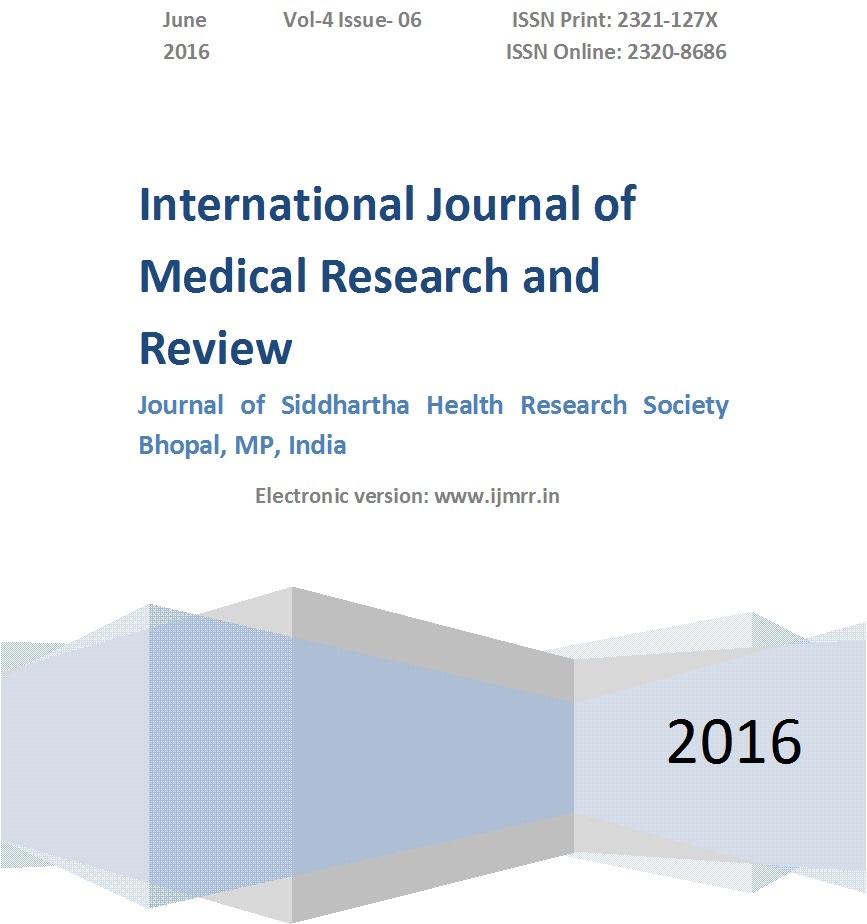Interrelationship of serum TSH with BMI in patients with thyroid disorders
Abstract
Introduction: The endocrine system is evaluated primarily by measuring hormone concentrations, thereby arming the clinician with valuable diagnostic information. Thyroid Hormones which increase the basal metabolic rate and thermogenesis have been reported to be one of leptins regulating factors because alterations of thyroid status might lead to compensatory changes in circulatory leptin.
Aim: The aim of this study was to find the correlation of Serum TSH with BMI in patients with thyroid disorder (hypothyroidism and hyperthyroidism).
Material & Methods: 30 diagnosed cases of thyroid disorders out of which 20 were of hypothyroidism and 10 were of hyperthyroidism and 30 healthy controls were recruited in our study. Serum TSH levels were estimated in both cases and controls using ELISA method. BMI was calculated using QUETLET’S index as body weight (kg) divided by height squared (m2).
Results: In our study we found a significant (p=<0.001) positive correlation(r=0.514) of TSH with BMI in hypothyroid patients whereas a non significant (p=.551) positive correlation(r=.215) was found in hyperthyroid patients.
Conclusion: Even small changes in the TSH levels can have an effect on BMI profile. In hypothyroid patients there is increase in weight so increase in BMI and also increase in TSH. On the other hand in hyperthyroid individuals there is loss of weight so decrease in BMI and also decrease in TSH. But further large scale data is required to confirm our findings.
Downloads
References
2. Dr Malcolm Kendrick (April 12, 2015).”Why being ’overweight’ means you live longer: The way scientists twist the facts” (http:/www.independent.co.uk/life-style/health-and-families/features/why-being-overweight-means-you-live-longer-the-way-scientists-twist-the-facts-10158229.html)
3. http:/www.independent.co.uk.Retrieved 12 April 2015.
4. Nagila A, Bhatt M, Poudel B, Mahato P, Gurung D, Prajapati S et al. Thyroid Stimulating Hormone and its Correlation with Lipid Profile in the Obese Nepalese Population. Journal of Clinical and Diagnostic Research. 2008; (2):932-937.
5. Milionis A, Milionis C. Correlation between body mass index and thyroid function in euthyroid individuals in Greece. ISRN Biomark. 2013; 2013:651494.
6. Feldt-Rasmussen U. Thyroid and leptin. Thyroid. 2007; 17(5):413-419.
7. Menendez C, Baldelli R, Camiña JP, Escudero B, Peino R, Dieguez C et al. TSH stimulates Leptin secretion by a direct effect on Adipocytes. J Endocrinol. 2003; 176(1):7-12.
8. Knudsen N, Laurberg P, Rasmussen LB, Bülow I, Perrild H, Ovesen L et al. Small differences in thyroid function may be important for body mass index and the occurrence of obesity in the population. J Clin Endocrinol Metab. 2005; 90(7):4019-4024.
9. Reinehr T. Obesity and thyroid function. Mol Cell Endocrinol. 2010; 316:165-171.
10. Hoogwerf BJ and Nuttall FQ. Long-term weight regulation in treated hyperthyroid and hypothyroid subjects. Am J Med. 1984; 76(6):963-70.
11. Asvold BO, Bjøro T, Vatten LJ. Association of serum TSH with high body mass differs between smokers and never-smokers. J Clin Endocrinol Metab. 2009; 94(12):5023-5027.
12. Al-Adsani H, Hoffer LJ, Silva JE. Resting energy expenditure is sensitive to small dose changes in patients on chronic thyroid hormone replacement. J Clin Endocrinol Metab. 1997; 82(4):1118-1125.
13. Spencer CA, Takeuchi M, Kazarosyan M, MacKenzie F, Beckett GJ, Wilkinson E. Interlaboratory/intermethod differences in functional sensitivity of immunometric assays of thyrotropin (TSH) and impact on reliability of measurement of subnormal concentrations of TSH. Clin Chem. 1995; 41:367-374.
14. Body Mass Index: Considerations for Practitioners. Department of Health and Human Services Centers for disease control and prevention. Available at: http://www.cdc.gov/ obesity/downloads/BMIfor Pactitioners.pdf.
15. Yoshida T, Momotani N, Hayashi M, Monkawa T, Ito K, Saruta T. Serum leptin concentrations in patients with thyroid disorders. Clin Endocrinol (Oxf). 1998; 48(3):299-302.
16. Tene Pérez CE, Revilla-Monsalve MC, Amato D, Escobedo de la Peña J, Galván R, Millán-Guerrero RO. Correlation between serum leptin levels and insulin sensitivity in diffuse toxic goiter. Endocr Res. 2004; 30(1):19-27.
17. Zimmermann-Belsing T, Brabant G, Holst JJ, Feldt-Rasmussen U. Circulating leptin and thyroid dysfunction. Eur J Endocrinol. 2003; 149(4):257-71.
18. Solanki A, Bansal S, Jindal S, Saxena V, Shukla US. Relationship of serum thyroid stimulating hormone with body mass index in healthy adults. Indian J Endocrinol Metab. 2013; 17 Suppl 1:S167-9.
19. Velivala AP, Paladugu L, Koyyala VP. Subclinical hypothyroidism in obese patients in rural general hospital. IOSR J Dent Med Sci. 2013; 5(4):8-10.
20. Azza M. Abdu-Allah, Riham G. Mahfouz, Seham A. Khodeer, Walid A. Shehab-Eldin, Mostafa El Nagar. Study of Resistin and Leptin in patients with Thyroid Dysfunction. Journal of American Science, 2011; 7(3):569-76.
21. Iacobellis G, Ribaudo MC, Zappaterreno A, Iannucci CV, Leonetti F. Relationship of thyroid function with body mass index, leptin, insulin sensitivity and adiponectin in euthyroid obese women. Clin Endocrinol (Oxf). 2005; 62(4):487-91.
22. Pinkney JH, Goodrick SJ, Katz J, Johnson AB, Lightman SL, Coppack SW et al. Leptin and the pituitary-thyroid axis: a comparative study in lean, obese, hypothyroid and hyperthyroid subjects. Clin Endocrinol (Oxf). 1998; 49(5):583-8.
23. Sestoft L. Metabolic aspects of the calorigenic effect of thyroid hormone in mammals. Clin Endocrinol. 1980; 13 (5): 489-506.



 OAI - Open Archives Initiative
OAI - Open Archives Initiative


